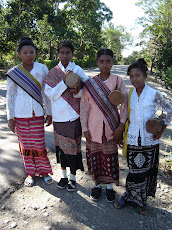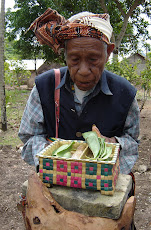This song is a beautiful song of praise about the beauty of Kefamenanu in Timor:
Thursday, July 24, 2008
Thursday, April 10, 2008
Uab Meto Blogspot
The language of the Atoin Pah Meto in Timor is called Uab Meto. In modern days, Uab Meto is popularly called Bahasa Dawan. Have you ever thought of learning Uab Meto, the language of the Atoin Pah Meto, in Timor? Why don't you have a try? Please visit:
http://www.uabmeto.blogspot.com. *****
http://www.uabmeto.blogspot.com. *****
The Bunaqese Philosophy
The Bunaqese is one of the tribes in Timor island, East of Indonesia. Like other tribes in Timor, the Bunaqese maintain a philosophy of life. This philosophy is based upon two inseparable notions, namely, the understanding of the Highest Holy and the cultural-religious rites. For the Bunaqese, the Highest Holy is called “Hot Essen”. The name of “Hot Essen” is believed as the source of the good things, truth and beauty. In the Bunaqese way of thinking, the goodness, truth and beauty of “Hot Essen” are revealed to human beings particularly to the tribal leaders called “Lal Gomo”. “Lal Gomo” have a special responsibility. They are responsible to translate the goodness, truth and beauty of “Hot Essen” into tribal religious rites. Members of the tribe are obliged to follow these rites for their living benefits. Only by following these rites, members of the tribe would find ways of receiving the blessings of the Eternal Source, that is, “Hot Essen”.
How are the religious rites conducted? Cultural rites of the Bunaqese can only be performed by the tribal leaders in a community since these rites are basically communal rites. Therefore there is no personal ritual performance. The communal performance of the Bunaqese rites symbolises the social relationship between members of the tribe and “Hot Essen” and within the tribal community itself. In fact this social relationship with “Hot Essen” and among members of the community is the foundation of the Bunaqese life.
For a more exploration of the Bunaqese philosophy, please visit my blog: http://www.benymali.blogspot.com. I wish to open a more space for dialogue on the Bunaqese philosophy, tradition and identity-building through this blogspot. Comments and suggestions are certainly welcomed. (Contributed by Rev. Beny Mali SVD).****
How are the religious rites conducted? Cultural rites of the Bunaqese can only be performed by the tribal leaders in a community since these rites are basically communal rites. Therefore there is no personal ritual performance. The communal performance of the Bunaqese rites symbolises the social relationship between members of the tribe and “Hot Essen” and within the tribal community itself. In fact this social relationship with “Hot Essen” and among members of the community is the foundation of the Bunaqese life.
For a more exploration of the Bunaqese philosophy, please visit my blog: http://www.benymali.blogspot.com. I wish to open a more space for dialogue on the Bunaqese philosophy, tradition and identity-building through this blogspot. Comments and suggestions are certainly welcomed. (Contributed by Rev. Beny Mali SVD).****
Wednesday, April 2, 2008
The Bunaqese Blogspot
Rev. Beny Mali SVD has an interesting blog on the Bunaqese culture in Timor. This blog provides a wide range information on the Bunaqese and their culture.
Sunday, March 30, 2008
The First Edition of Lia Dadolin
 Lia Dadolin is a journal produced and published by the Manse Nsae Research Center. The first edition of Lia Dadolin has been just launched. Lia Dadolin publishes articles in both English and Indonesian.
Lia Dadolin is a journal produced and published by the Manse Nsae Research Center. The first edition of Lia Dadolin has been just launched. Lia Dadolin publishes articles in both English and Indonesian.The name of this journal, Lia Dadolin, was first introduced by Rev. Stanis Bessin SVD and Rev. Gregor Neonbasu SVD. Rev. Bessin is one of the former Provincial Superiors of the Divine Word Missionaries, Timor Province in Indonesia. He himself has a deep love of the Timorese cultures. Rev. Neonbasu has a Doctorate in Anthropology from the Australian National University. He has actively written and published articles and books particularly on Timor and her cultures. Currently, he is the Director of the Manse Nsae Research Center.
Every name has a meaning. Lia Dadolin, is a phrase in Tetun, one of the languages in Timor. This phrase consists of two words: Lia and Dadolin. Lia means word, voice, message, fruit and sound. The word Dadolin originates from the words dolin-dolin which means “to go, to proclaim, to extend, to pass on”. The prefix da is later attached to dolin-dolin in which the word Dadolin is formed. Dadolin literally means “something that happens so many times” or “something that happens continuously”. The term Lia Dadolin, therefore, addresses the continuous process of proclaiming the Word of God till the Word lives in the heart of mankind and in the mind of those who listen to it.
In this first edition of Lia Dadolin, experts from various backgrounds discuss themes such as leadership, spirituality and theology, human resources and education in East Nusa Tenggara, economic development in the context of Timor and the basic principles for developing the right rule of law based upon the Indonesian experience. Since this is the first edition, Rev. Fr. Felix Kosat SVD, the Provincial Superior of SVD Timor Province has a privilege to introduce the journal. Following this introduction, the Director of the Center, Dr Gregor Neonbasu SVD wrote an article in which he introduces the Manse Nsae Research Center, its vision and mission, commitment and strategic steps towards the social and cultural studies in East Nusa Tenggara, Indonesia.****
"Don't Be Angry With Me"
Marriage in Timor is a family affair. Since it is a family affair, marriage is not simply organised by a man and a woman. Instead, it is organised by two families. Therefore, even though marriage is between a man and a woman, in Timorese view, in marriage, two families (not only two people) become one.
The title of this simple song is "Kais Muto'an kau" which means "Don't be angry with me". It is basically a plea of a young man for his parents' forgiveness. Why does he ask for forgiveness? He has chosen a woman to be a soul mate. However, it seems that his father and mother are not in favour of his choice. He insists that his choice is based upon a profound love. For this reason, he considers his choice as the best he can take.
The song does not describe the response of his parents. However, it is quite common, particularly among the Dawanese, that men normally ask for their parents' forgiveness if they feel that they have chosen their soul mates before consulting their parents. Normally this request opens the way for a man's parents and family to start negotiating with the woman's family. Following this logic, it could be argued that a plea for forgiveness of a young man to his parents before marriage is not simply an act of obedience. Moreover, it is an unwritten ceremony in which a man receives his parents' blessing to enter a new stage of life.***
(Written by G. Faimau)
The title of this simple song is "Kais Muto'an kau" which means "Don't be angry with me". It is basically a plea of a young man for his parents' forgiveness. Why does he ask for forgiveness? He has chosen a woman to be a soul mate. However, it seems that his father and mother are not in favour of his choice. He insists that his choice is based upon a profound love. For this reason, he considers his choice as the best he can take.
The song does not describe the response of his parents. However, it is quite common, particularly among the Dawanese, that men normally ask for their parents' forgiveness if they feel that they have chosen their soul mates before consulting their parents. Normally this request opens the way for a man's parents and family to start negotiating with the woman's family. Following this logic, it could be argued that a plea for forgiveness of a young man to his parents before marriage is not simply an act of obedience. Moreover, it is an unwritten ceremony in which a man receives his parents' blessing to enter a new stage of life.***
(Written by G. Faimau)
Manse Nsae Research Center
 The
The The
Having this center is indeed urgent as far as the study of East Nusa Tenggara cultures is concerned. Based upon its mission, this center is committed to study the richness of cultures in East Nusa Tenggara. Moreover, the
Leading experts on the East Nusa Tenggara studies in the fields of anthropology, sociology, missiology, theology and ethnology have also been consulted for the development of the center. Prof James J. Fox (
****
Subscribe to:
Comments (Atom)


